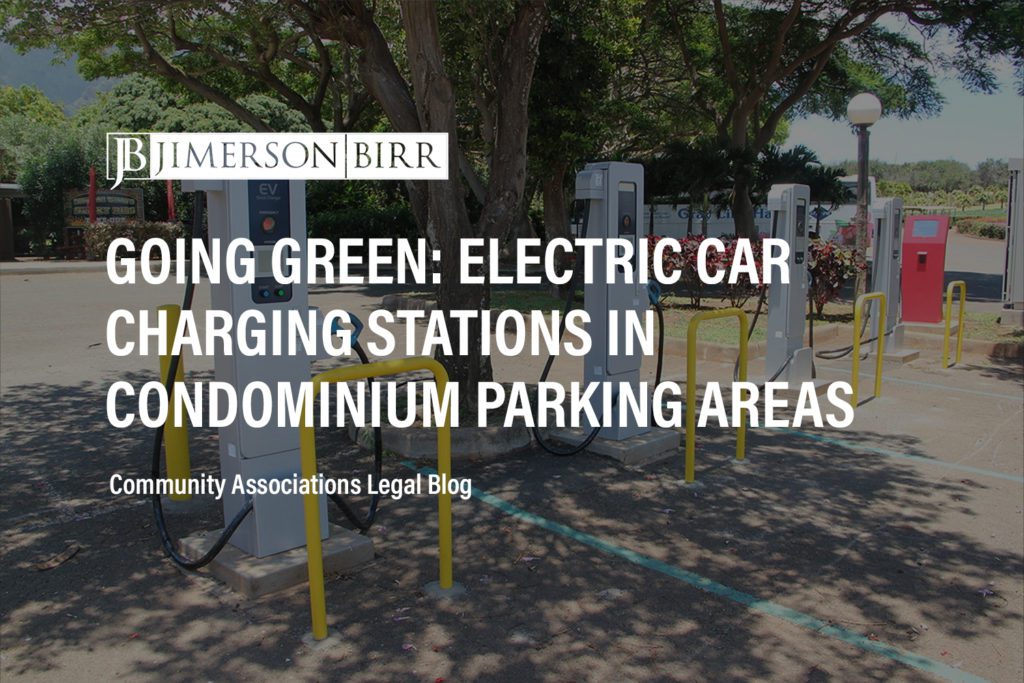In 2018, the Florida Legislature amended section 718.113 of the Florida Statutes to include a provision requiring that condominium associations allow unit owners to install electric charging stations in limited common element parking areas assigned to each unit owner. The statute does not apply to common element parking spaces.
What’s the Difference?
Unit owners own an undivided interest in both limited common elements and common elements. Limited common elements, however, vest unit owners with an individual right to use a specific common element. In the context of parking spaces, this means the unit owner is assigned a particular parking space that other unit owners cannot use. On the other hand, common element parking spaces are available for use by all unit owners.
Develop a Plan
Some community associations may believe it unlikely for a unit owner to request to install an electric charging station. These associations may fail to consider how they will handle such a request. This mistake may result in a big headache for the association. Due to the complexity of installation and incidental effects on other unit owners, community associations should not underestimate the importance of proactively developing a plan for handling requests. Below are several factors associations should consider when developing their plan:
- The association should understand the substance of Section 718.113(g) of the Florida Statutes. For a more detailed overview of Section 718.113, please visit Going Green: Installation of Electric Vehicle Charging Stations in Condominium Parking Areas.
- The association should review its governing documents, which include the declaration, articles of incorporation and bylaws. While the governing documents may not specifically address installation of electric charging stations, they may address restrictions on modification of limited common elements. In essence, installation of electric charging stations are simply modifications of limited common elements.
- The association should determine whether the condominium property has the electrical capacity necessary to support the installation and use of electric charging stations. If the property lacks such capacity, the association should inform the unit owner requesting installation that he must pay the costs associated with increasing the electrical capacity.
- The association should develop reasonable rules and regulations governing installation, maintenance and operation of electric charging stations. When developing these rules and regulations, the association must ensure they comply with Section 718.113 of the Florida Statutes. For instance, electricity for electric charging stations must be separately metered and payable by the unit owner requesting installation. To ensure full compliance, the association should seek guidance from an experienced attorney.
- The association should develop a well-rounded policy for reviewing, evaluating and approving requests. The association should require unit owners to submit plans showing the dimensions, placement and appearance of proposed electric charging stations. Prior to approving the plans, the association should ensure they comply with reasonable architectural standards, applicable building codes and safety standards.
- The association should consider its potential liability and work with an experienced attorney to draft a written agreement limiting its liability. For instance, the association should include a provision requiring the requesting unit owner to indemnify and defend the association from any liability or damage incurred in connection with the charging station.
Electric Charging Stations in Common Elements
Some associations may attempt to circumvent the requirements of section 718.113 by installing electric charging stations in the common elements. Florida courts have not yet addressed the issue. For now, associations should continue to allow unit owners to install their own charging stations in the limited common elements, regardless of whether the association installs them in the common elements. This does not mean, however, that associations should avoid installing charging stations in the common elements.
The following are some advantages of installing charging stations in the common elements:
- improves property values of condominium units
- provides the association with greater control over the installation, maintenance and operation of the charging stations
- reduces the likelihood individual unit owners will request the installation of electric charging stations in limited common elements
Associations that install charging stations in the common elements may be tempted to charge unit owners for using them. At first glance, this seems like a great idea. Use fees generate revenue for the association, reduce costs and please unit owners who do not use the charging stations. However, Section 718.111(4) of the Florida Statutes prohibits condominium associations from charging unit owners a fee for using the common elements of the condominium property unless one of the following occurs:
- the declaration of the condominium allows the association to charge a fee;
- a majority of the association votes in favor of charging the fee; or
- the fee relates to expenses incurred by an owner having exclusive use of the common elements.
This means associations cannot charge unit owners a fee for using the charging stations unless one of the above three events occurs. Associations should exercise caution and contact an experienced attorney with questions about their governing documents. In some instances, amendment may be necessary.
Conclusion
Due to technological advances and a greater focus on “going green,” electric vehicles are becoming more common. Condominium associations should act proactively in developing a plan for dealing with unit owner requests to install electric charging stations in limited common elements. An experienced attorney can assist associations with developing this plan and ensure the association fully complies with the requirements of section 718.113 of the Florida Statutes. Associations should also consider whether installing electric charging stations in the common elements would benefit unit owners.

